Disclosure: Meeple Mountain received a free copy of this product in exchange for an honest, unbiased review. This review is not intended to be an endorsement.
I don’t take myself for a sucker, but anytime someone says “I have a 20-minute tableau builder that I think you’ll love”, I will always take them up on that offer.
I ran into a content creator who I enjoy at SPIEL ‘22, and since he was working a booth, he handed me a copy of Aldabas: Doors of Cartagena (2022, Grand Gamers Guild). I told him that I had already picked up 40 other games at the convention, but he was committed. “Just give this one a look. I think you’ll like it.”
It’s okay to have a polite disagreement from time to time. Aldabas, designed by Nathaniel Levan and Joshua Mills, has great art and quick turns. And while I wish the game provided bigger thrills or chances for greater interaction, that isn’t my main issue here.
Instead, its barrier to entry is a strange one: the scoring conditions are a maze.
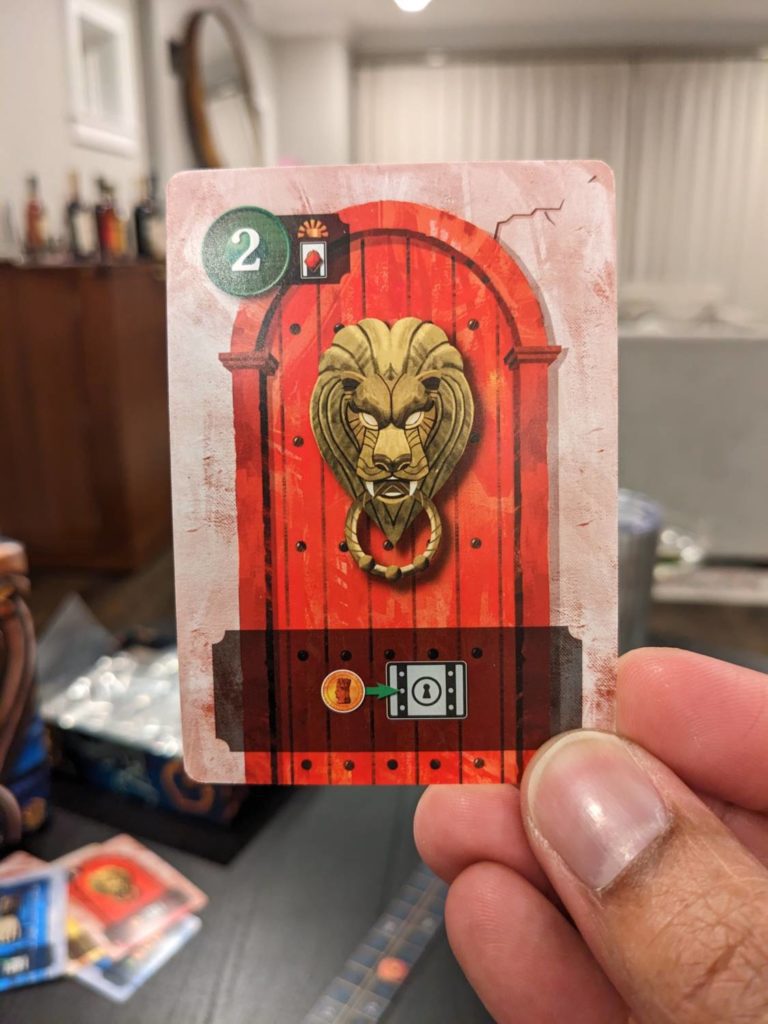
Knock at the Cabin
“Aldabas” (the Spanish word for door knockers) served as a way for residents to visually announce their profession to other neighbors in colonial times. In the game, players are trying to fill their neighborhood with people from five different professions by building a tableau. Aldabas (the game) has one of the strangest themes I can think of—you will try to get soldiers, fishermen, nobles, clergy and builders to live in your neighborhood because of, well, something. Prosperity, maybe?
I won’t pretend that you’ll be thinking about churches while building your tableau, but that’s the hand Aldabas gives you. It also gives you five cards for your starting hand as you take two actions each turn: take some coins, play a card from your hand (the “Place One Door” action), and/or buy a door from the market of five cards.
The game’s goal: score the most points. You’ll do that by building out a “block” of these five professions by placing cards in a 4×3 tableau. Each card has Influence ranging from 1-3 points, and these cards can be strengthened with various action effects that trigger when each card is placed. Another restriction: cards have to be a different color than the cards orthogonally adjacent to the placed card. (There are three colors: red, blue, and yellow.)
Taking actions and moving between players is quick in Aldabas. And the game looks quite handsome on the table thanks to the card art (and door knockers) by illustrator Juan Vargas. It runs into a strange problem when teaching the game then resolving scores at the end of play: it’s surprisingly difficult to score the action when it’s all over.
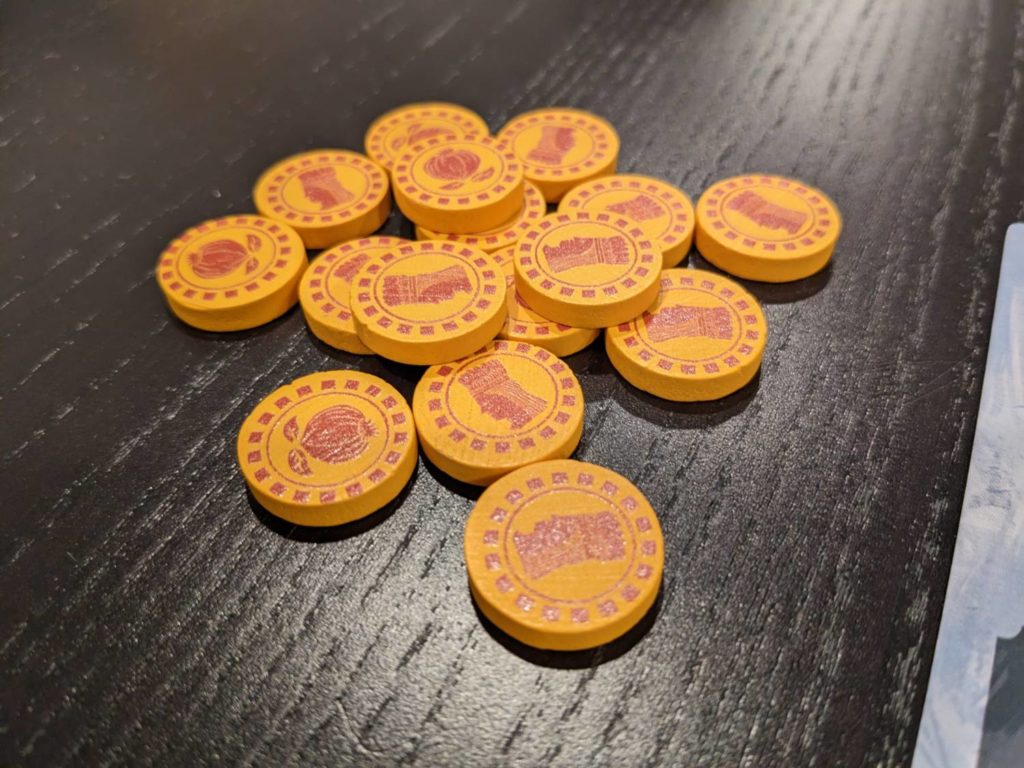
“So, I Need Nobles to Score Soldiers?”
The game ends when the market deck runs out, the supply of coins runs out, or someone has built their 11th card. (The game has a vault that can store coins and cards, and that vault serves as the first “card” of a player’s 12-card tableau. I know, I know; it doesn’t look right and it doesn’t make sense that the vault is the biggest thing in the tableau. I’m just telling you how the game works!)
The gameplay in Aldabas is a breeze…right up until it is not, thanks to the dense scoring mechanic (dense for a light game, anyway).
Each of the game’s five professions score differently. Also, some of those cards score for things in your hand, versus the “block” of played tableau cards. Other cards in a block just score points straight up, printed directly on the card. Also, each of the cards has an Influence rating, and the player with the most Influence in their block plus Vault cards gets a small end-game bonus.
And this is all laid out on the back of each player’s Vault, which is a nice player aid if you don’t have access to the rules nor need to constantly flip the Vault to reveal the player aid. (A major fail, IMHO; separate player aids would have been quite helpful here.)
That means that scoring is a bit of an adventure. Like other area majority games, the key to winning is scoring as many of the five suits as possible in Aldabas. But one thing makes this a major challenge: knowing exactly what your opponents are doing.
I’m not even talking about the cards each player stashed into their Vaults during play. It’s just hard to know what the guy across the table from you is doing without walking over to his tableau, every turn, and getting a sense of his public scoring progress. I was amazed how often I didn’t once bother to look at what other players were really doing, save for knowing how close they were to finishing their tableau and possibly ending the game.
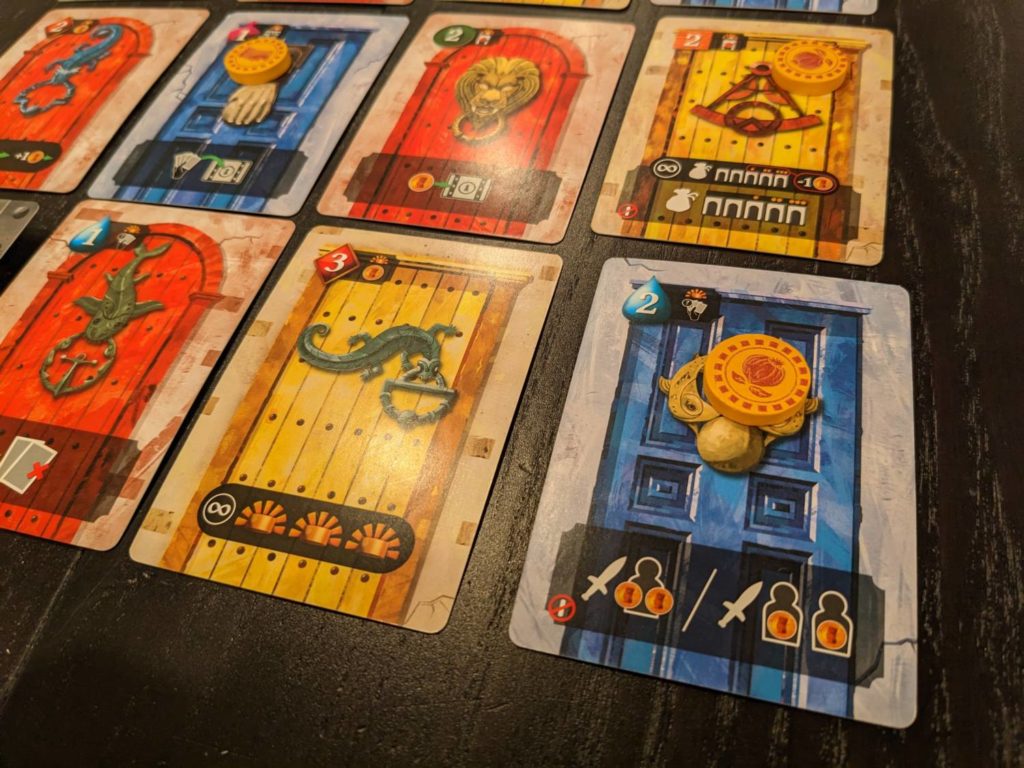
Whoa, Not WHOA!!
Aldabas provided some interesting moments during my four plays, but nothing that screamed “YOU MUST BUY THIS NOW.”
That’s because the scoring mechanic is such a grab bag. In a typical game, it’s hard to keep up with what every other player is doing without pausing to stare at another player’s handiwork. I found myself always taking 3-influence cards that offered three points at game’s end; I would be surprised if most people did something different during playtests for this game.
Everything about Aldabas is OK. It’s never bad, but I found myself grinding through enough plays to write this review. Had this been a game I tried just once, that would have been enough. It gets the production elements right; the artwork is great, and the wooden coins are a nice touch. I don’t know why the card stock for Aldabas is so thick; these might be the least bendable cards I have struggled to shuffle, ever.
Another strange note: the Vault. I don’t know why it is so large, but I also don’t know why it is so prominently featured. The theme tells me I’m trying to bring in the best and brightest neighbors into my block. But is the block dangerous? Is that why I need to constantly get money from my purse (an area near the vault that allows other players to rob your stash of coins) to the Vault? Why are the Fisher residents so good at taking coins from other players? Is there a history of fishermen stealing from local residents in Cartegena?
Items like this confirm my sense that Aldabas feels a bit messy. This is a door I won’t knock again!


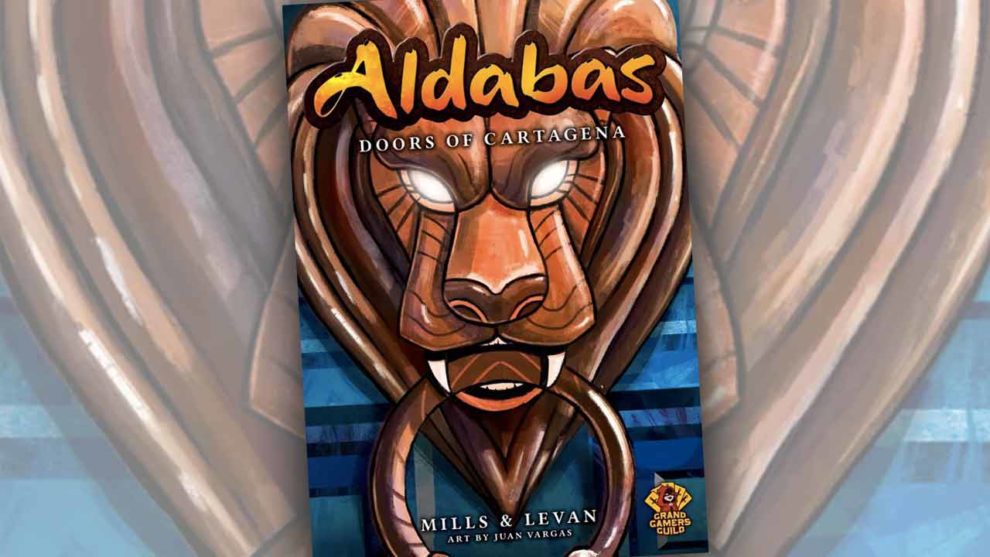

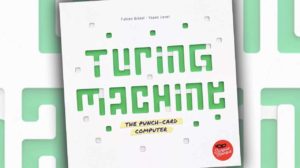







Add Comment